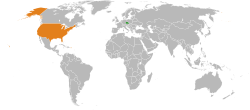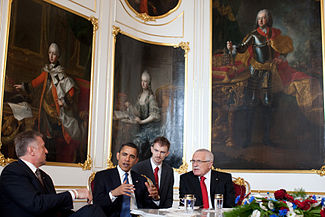- Czech Republic–United States relations
-
Czech Republic – United States relations 

Czech Republic
United StatesContents
History
Post World War I
U.S. President Woodrow Wilson and the United States played a major role in the establishment of Czechoslovakia on October 28, 1918. President Wilson's 14 Points, including the right of ethnic groups to form their own states, were the basis for the union of the Czechs and Slovaks. Tomas Masaryk, the father of the state and its first President, visited the United States during World War I and worked with U.S. officials in developing the basis of the new country. Masaryk used the U.S. Constitution as a model for the first Czechoslovak constitution.
Post-World War II and communist Czechoslovakia
After World War II, the Czechoslovak government-in-exile returned. Normal relations continued until 1948, when the communists seized power and relations cooled rapidly. The Soviet invasion of Czechoslovakia in August 1968 further complicated U.S.-Czechoslovak relations. The United States referred the matter to the UN Security Council as a violation of the UN Charter, but no action was taken against the Soviets.
Velvet Revolution
Since the Velvet Revolution of 1989, bilateral relations have improved immensely. Dissidents once sustained by U.S. encouragement and human rights policies reached high levels in the government. President Václav Havel, in his first official visit as head of Czechoslovakia, addressed the U.S. Congress and was interrupted 21 times by standing ovations. In 1990, on the first anniversary of the revolution, President George H. W. Bush, in front of an enthusiastic crowd on Prague's Wenceslas Square, pledged U.S. support in building a democratic Czechoslovakia. Toward this end, the U.S. Government has actively encouraged political and economic transformation.
The U.S. Government was originally opposed to the idea of Czechoslovakia forming two separate states, due to concerns that a split might aggravate existing regional political tensions. However, the U.S. recognized both the Czech Republic and Slovakia on January 1, 1993. Since then, U.S.-Czech relations have remained strong economically, politically, and culturally.
Current issues
Iraq War and the larger "War on Terror"
Main article: Multinational force in IraqIn 2003, the Czech Government sent a small contingent of elite anti-chemical weapons warfare experts to Kuwait to support the then-impending U.S. led invasion of Iraq.[1] Despite governmental support for the war, an overwhelming majority of Czechs opposed the U.S. led invasion of Iraq throughout the lead up to the war and immediately following the invasion. A public opinion poll conducted in March 2003 found that over 70 percent of the population opposed the war even with a UN mandate while 83 percent of Czechs were against the war in Iraq without a mandate. Furthermore, the same poll found that 82 percent of Czechs believe that the U.S. bases its foreign policy "according to its own power and economic interests.[2]" Czech opposition to the war did not amount to the level of massive visible street demonstrations such as those seen in other cities around the world. On February 15, 2003, only 1,500 people attended a rally against the war in Wenceslas Square in Prague.[3]
Missile defense system
A missile defense system was planned to be installed at Brdy part of the Czech Republic.[4] It should have been an X band radar system that would work with a missile site in Redzikowo, Poland.[5] In August 2008, the Czech Security Information Service (BIS) published the report for the year 2007, in which it says that Russian secret agents (spies) have been from the beginning highly influencing the public opinion against the building of US radar in Czech republic.[6] In September 2008 Czech Military Counter-intelligence confirmed the report of BIS.[7] "BIS claims, that the russian espionage is currently at high intensity and level." Russians secret agents mainly influence the people, that can have a great influence on public opinion. After Barack Obama was elected the President of the United States, there were speculations that he might stop the project. The final decision to scratch the plans was announced on 17 September 2009 by a phone call from Obama to Czech Prime Minister Jan Fischer.
Notes
- ^ "Prospect of Iraq war divides NATO". Radio Prague. 2003-02-11. http://www.radio.cz/en/article/37427. Retrieved 2008-03-04.
- ^ "New poll reinforces anti-war sentiment in the Czech Republic". Radio Prague. 2003-03-26. http://www.radio.cz/en/news/39044#3. Retrieved 2008-03-04.
- ^ "Low Turnout for Prague's Anti-war Protests". Radio Prague. 2003-02-17. http://www.radio.cz/en/article/37641. Retrieved 2008-03-04.
- ^ "U.S.-Czech Events Related to Missile Defense Cooperation". U.S. Embassy in Prague. http://prague.usembassy.gov/md705_chronology.html.
- ^ "Brdy, Czech Republic". GlobalSecurity.org. http://www.globalsecurity.org/space/facility/brdy.htm.
- ^ http://zpravy.idnes.cz/rusti-agenti-chteji-v-cesku-vyvolat-odpor-k-radaru-varovala-bis-psn-/domaci.asp?c=A080925_093519_domaci_ipl
- ^ http://zpravy.idnes.cz/vojenska-rozvedka-potvrdi-zpravu-bis-o-aktivitach-ruskych-sluzeb-10e-/domaci.asp?c=A080928_133002_domaci_ban
References
- US State Department Copy of public domain text
External links
 Media related to Czech Republic – United States relations at Wikimedia Commons
Media related to Czech Republic – United States relations at Wikimedia CommonsForeign relations of the Czech Republic Americas Argentina · Canada · Colombia · United States
Africa & Asia Europe Missions  Foreign relations of the United States
Foreign relations of the United StatesBilateral relations Africa Algeria · Angola · Benin · Botswana · Burkina Faso · Burundi · Cameroon · Cape Verde · Central African Republic · Chad · Comoros · Democratic Republic of the Congo · Republic of the Congo · Côte d'Ivoire (Ivory Coast) · Djibouti · Egypt · Equatorial Guinea · Eritrea · Ethiopia · Gabon · The Gambia · Ghana · Guinea · Guinea-Bissau · Kenya · Lesotho · Liberia · Libya · Madagascar · Malawi · Mali · Mauritania · Mauritius · Morocco · Mozambique · Namibia · Niger · Nigeria · Rwanda · São Tomé and Príncipe · Senegal · Seychelles · Sierra Leone · Somalia · South Africa · South Sudan · Sudan · Swaziland · Tanzania · Togo · Tunisia · Uganda · Zambia · ZimbabweAsia Middle East Bahrain · Egypt · Iran · Iraq · Israel (Military relations) · Jordan · Kuwait · Lebanon · Oman · Qatar · Saudi Arabia · Syria · United Arab Emirates · YemenElsewhere Afghanistan · Bangladesh · Bhutan · Brunei · Burma · Cambodia · People's Republic of China (Hong Kong · Macau) · East Timor · India · Indonesia · Japan · Kazakhstan · Kyrgyzstan · Laos · Malaysia · Maldives · Mongolia · Nepal · North Korea · Pakistan · Philippines · Russia · Singapore · Sri Lanka · South Korea · Republic of China (Taiwan) · Tajikistan · Thailand · Turkmenistan · Uzbekistan · VietnamEurope Albania · Andorra · Armenia · Austria · Azerbaijan · Belarus · Belgium · Bosnia and Herzegovina · Bulgaria · Croatia · Cyprus · Czech Republic · Denmark · Estonia · Finland · France · Georgia · Germany · Greece · Hungary · Iceland · Ireland · Italy · Kosovo · Latvia · Liechtenstein · Lithuania · Luxembourg · Macedonia · Malta · Moldova · Monaco · Montenegro · Netherlands · Norway · Poland · Portugal · Romania · Russia · San Marino · Serbia · Slovakia · Slovenia · Spain · Sweden · Switzerland · Turkey · Ukraine · United Kingdom (Special Relationship) · Vatican CityNorth America Caribbean Antigua and Barbuda · Aruba · Bahamas · Barbados · Bermuda · Cayman Islands · Cuba · Dominica · Dominican Republic · Grenada · Haiti · Jamaica · St. Kitts and Nevis · St. Lucia · St. Vincent and the Grenadines · Trinidad and TobagoElsewhere Belize · Canada (Trade) · Costa Rica · El Salvador · Guatemala · Honduras · Mexico · Nicaragua · PanamaOceania ANZUS Australia · New ZealandElsewhere Fiji · Kiribati · Marshall Islands · Micronesia · Nauru · Palau · Papua New Guinea · Samoa · Solomon Islands · Tonga · Tuvalu · VanuatuSouth America Argentina · Bolivia · Brazil · Chile · Colombia · Ecuador · Guyana · Paraguay · Peru · Suriname · Uruguay · VenezuelaFormer states Kingdom of Hawaii · Netherlands Antilles · Republic of Texas · Russian Empire · Soviet Union
Multilateral relations Arab League · European Union · Latin America · Africa · United Nations · Third Border Initiative · International organizationsDoctrines, policies, concepts Presidential
doctrinesProclamation of Neutrality · Monroe · Roosevelt Corollary · Good Neighbor policy · Truman · Eisenhower · Kennedy · Johnson · Nixon · Carter · Reagan · Clinton · Bush · ObamaOther doctrines Policies and
conceptsCategories:- Bilateral relations of the United States
- Bilateral relations of the Czech Republic
- Czech Republic–United States relations
Wikimedia Foundation. 2010.

